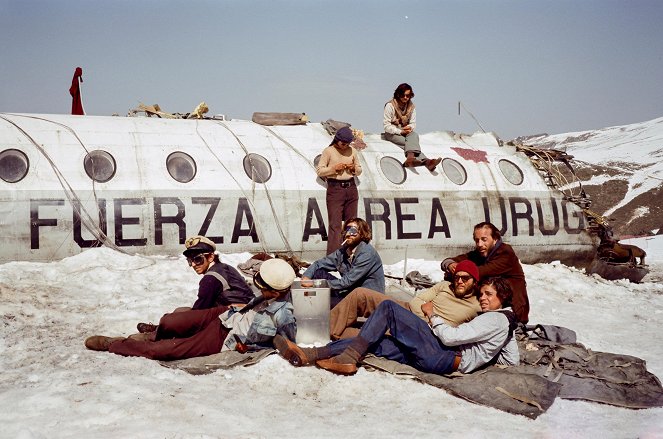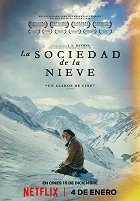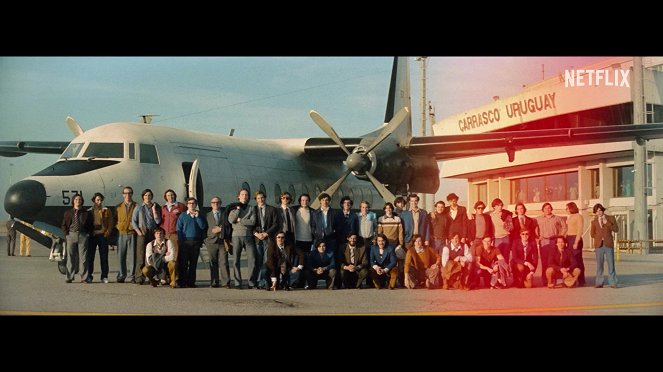Director:
J.A. BayonaCámara:
Pedro LuqueMúsica:
Michael GiacchinoReparto:
Enzo Vogrincic, Matías Recalt, Agustín Pardella, Rafael Federman, Esteban Bigliardi, Alfonsina Carrocio, Paula Baldini, Rogelio Gracia, Pablo Vierci (más)Streaming (1)
Sinopsis(1)
En 1972, el vuelo 571 de la Fuerza Aérea Uruguaya, que llevaba a Chile a un equipo de rugby, sufrió un choque catastrófico en un glaciar en lo más profundo de los Andes. Solo sobrevivieron al impacto 29 de los 45 pasajeros. Atrapados en uno de los entornos más inclementes del mundo, los supervivientes no tienen más remedio que recurrir a medidas extremas para seguir con vida. (Tripictures)
(más)Videos (5)
Reseñas (6)
La conocida historia de un accidente aéreo en los nevados Andes, cuyos pasajeros náufragos tuvieron que recurrir al canibalismo para sobrevivir, ya fue abordada en la película estadounidense ¡Viven! de 1993. En comparación, Bayona ofrece una visión más moderna y superior, una cinematografía de primer nivel (que incluye una excelente cámara y una intensa escena del propio accidente), y además, junto con los actores, devuelve esta historia sobre el poder de la voluntad y la tenacidad humana al suelo hispanohablante. Pero eso es básicamente todo, porque la trama de la película obviamente no tiene nada que sorprender. Los personajes individuales son, salvo excepciones, intercambiables entre sí, y sus desgarradores destinos sirven a la película principalmente para conmover emocionalmente al espectador. Pero lo bueno de esto es que es realmente un drama de supervivencia de aventuras honesto y realista en detalle, libre de la necesidad de meter conflictos personales entre los personajes en la trama, que así pueden centrarse más en el lado práctico de su propia supervivencia. También se agradece el bajo nivel de patetismo y un enfoque muy decente y humano del tema del consumo de carne humana.
()
El subtítulo de la novela en la que se basa la película es "La descripción definitiva de la mayor historia de supervivencia del mundo" y yo usaría la palabra "definitiva" incluso en relación con la adaptación cinematográfica de esta historia. Es bueno que la película fuera una coproducción hispano-uruguaya y que Bayona fuera un candidato ideal para este material; con su nombre adjunto a esta película, también uno sabe de antemano qué esperar. La sociedad de la nieve es una escalofriante supervivencia bien elaborada que puede cautivar y evocar simpatía por el destino de personajes cuyas circunstancias de vida han sido extremadamente crueles. La escena culminante de la película es un accidente de avión rodado con precisión, cuya intensidad y malestar pueden ser muy estresantes: yo todavía oigo el crujido de los huesos en mis oídos. Además, me gustaría destacar la secuencia con avalanchas, durante las cuales la omnipresente perdición y desesperanza pudieran ser cortadas con un cuchillo. La historia de los supervivientes de un naufragio en el corazón de los Andes es atemporal y universal gracias a las preguntas fundamentales que cada uno debe responder por sí mismo y, afortunadamente, la gran mayoría de nosotros sólo de forma hipotética. ¿Qué está dispuesto y es capaz de hacer el hombre para su propia supervivencia? ¡Cualquier cosa!
()
Esas 140 minutos pasará como agua. J. A. Bayona domina el oficio y las reglas del género, y tiene en sus manos una fuerte historia real. No se detiene en el prólogo ni en el avión volando, y arroja a sus personajes al infierno de la nieve lo antes posible. Solo allí los conocemos. Las mutuas confesiones de sentimientos en una situación desesperada funcionan y el creciente número de personas que mueren constantemente añade dramatismo. El canibalismo se presenta discretamente y sorprende sobre todo por el tiempo que los héroes de la historia tuvieron que funcionar en él. Y cómo se acostumbraron a él. Buenos actores y un impresionante cierre de la película con ideas entre líneas. Solo tengo una objeción al trabajo con la orientación en la edición de algunas tomas de la exploración del área montañosa alrededor del avión.
()
Bayona is a master of the disaster effect. Whereas Alive was a matter of leaving certain things somewhat in the abstract, physical details are not absent in Society of the Snow. Does that necessarily lead to a deeper experience? No, but it doesn’t seem out of place and tasteless like some of the emotional-blackmail moments in Stand by Me. I could have done without the conjuring with the (unreliable) narrator, but it’s not worth concealing the fact that, despite the slight distance that this refined filmmaking evokes, this film has an excellent pace and the actual event on which it is based has enough...well, meat on the bone is perhaps not an appropriate analogy. In any case, Society of the Snow manages to reconcile reverence with adrenaline. Nevertheless, I still think Alive is the better film (also because I associate it with the experience of going to the cinema when I was a kid) and the excellent documentary Stranded offered greater emotional and psychological depth.
()
Bayona was the perfect choice for this kind of story. Even though there’s already a similar film out there and it doesn’t bring much new to the table, Society of the Snow is a blast. After The Impossible, Bayona proves once again that he knows how to handle large-scale disaster scenes. Absolutely intense!
()
Galería (32)
Foto © Netflix



Anuncio